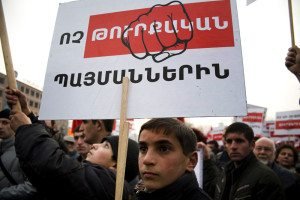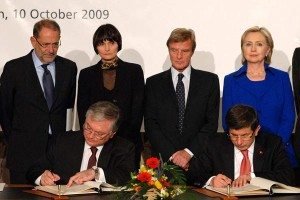Another look at the Armeno-Turkish protocols, and where we stand today
The Armenian Weekly March 2014 Magazine:
Armenia’s Foreign Policy in Focus
IT SEEMS LIKE YESTERDAY when Armenians worldwide loudly condemned the protocols signed by Armenia and Turkey, which ostensibly sought to normalize relations between the two neighboring states.

And yet, it is a fact that four years have passed, with the issue held in suspended animation, lacking parliamentary ratification from either side, despite the signature of both foreign ministers.
I have no desire to rehash the details of these protocols—a failed document from numerous standpoints. Suffice it to say that now, as then, the protocols jeopardize Armenia’s sovereignty and claims to justice by a) rendering the Armenian Genocide debatable; b) declaring null and void any Armenian territorial claims of Turkey; and c) implicitly authorizing Turkey to play a role in Armenia’s dispute with Azerbaijan over Nagorno-Karabagh—all, presumably, for the sake of reopening the Armeno-Turkish border and restoring full diplomatic and economic relations.
What interests me now is why each country remains quiet on this matter, taking no appreciable steps toward resolution, nor even discussing the protocols, except when the question is raised by journalists. Such deafening silence cannot be incidental. Rather, it points to the protocols as a tactical, rather than strategic or fundamental, document. That is, Turkey and its allies, in all likelihood, saw a tactical opening in 2009, sized up the situation accordingly, and put forth a proposal that was a “win-win,” no matter how it ultimately fared. To wit:
—They likely saw President Serge Sarkisian’s regime for what it was (and is): a) a regime with tarnished legitimacy following the ugly 2008 presidential elections; b) a regime whose demonstrated reflexes in matters of diplomacy were passive, sluggish, and often conciliatory; and c) a regime that desperately sought to produce something new, such as an open border with Turkey, to demonstrate its openness internationally, and as a public relations remedy for its own underperforming economy.
—They asked for things fundamental (e.g., renunciation of territorial claims) in return for something that is tactical and reversible at any time (opening of borders). Moreover, the opening of borders was ballyhooed as an end in itself, an inherent good, when the all-important details (e.g., terms of trade, tariff regimes, export subsidies) had not been researched.
—Above all, the protocols enabled Turkey, Switzerland, the U.S., and others to claim that a “process” was underway, aiming to patch up the two nations’ differences. This thereby undermined Armenian advocacy for genocide recognition and related issues. It was not hard, after all, to label such advocacy as counterproductive, if they stood in the way of what seemed to be tangible progress.
So what now? From the looks of it, Turkey is not interested—at least not at this time—in advancing the protocols. Perhaps this is due, in part, to protests from Azerbaijan, which is concerned that an open border with Turkey could relieve pressure from its own blockade on Armenia’s eastern front. Or perhaps Turkey is biding its time, waiting for the next opportune moment to raise the matter again, for who knows what purpose. In any case, it has not been debated inside Turkey for many months now.

The Armenian side, meanwhile, is trying to pretend the protocols never happened—almost like a bad dream or headache. When questioned by critics, government officials usually brush them off, to the effect of, “Why do you even raise this matter? Let sleeping dogs lie.” Unfortunately, the protocols are not something that can be wished away; unless President Sarkisian instructs his foreign minister to withdraw his signature, Turkey may revive the protocols process at any time, leaving Armenia in a situation where it would have to follow suit or say “no,” thus inviting outside scrutiny and pressure.
Much better would be a pro-active position, for example, withdrawing support for the protocols by citing Turkey’s own lack of sincerity in heating up then cooling down the issue. This, in fact, would simply follow through on Sarkisian’s own pronouncements in 2009-10, when, under a firestorm of diasporan criticism, he assured audiences that Armenia would withdraw if it sensed that Turkey was not promptly acting on its stated intentions. We are still waiting for this to materialize…
Meanwhile, it appears that “business-as-usual” is the order of the day, on this, the eve of the genocide centennial. Turkey continues to dart and weave like a trained boxer, sometimes friendly and sometimes hostile, sometimes alluding to dark pages of its past and the vague need for redress, at other times continuing its aggressive anti-Armenian rhetoric and posture, all the while firmly rooting its tactics in the culture of denial.
Armenia, meanwhile, seems timid, unfocused, and determined not to rock the boat. Even the formation of a government-sanctioned committee for the centennial, a seemingly welcome initiative, has thus far been a formality, organizing the usual conferences and seminars without an innovative edge in style or in substance. Carrying the agenda forward—from recognition to reparations and toward eventual restitution—seems, alas, to be left to the diaspora. This is truly unfortunate, for without Armenia’s leadership, our work in this area will remain pointed uphill.
There is still time, but the clock is ticking…


Mr. Antranik kasbarian´s observations-above-are very much to the point(s).he has pinpointed all that we were to loose, had these protocols not been ¨failed¨.One thing that is usually unobserved,no, not only by him ,but the majority of our politically minded people,is that great Turkey HAS THE last say in whatever little brother Azerbeijan does or intends to do.
With all due respect to him,he forgets that Azerbeijan -without his or ¨other¨allies or ¨friends¨ support stands to loose ALL.
Firstly,as I have emailed to many(I am not published by Armenian press)we must reciprocate to Azerbeijan by our REAL CLAIMS, vs. their false and untrue ones IMMEDIATELY,now!!!!
A. prepare Claim and lodge it with appropriate instances(a Class Action lawsuit) all those whose properties were confiscated in Baku,Sumgait and most importantly tie this up with the OTHER, that I ¨suggest¨herewith and above emails…that of OIL WQELLS AND INDUSTIRES THAT OUR compatriots , mantashian, lazarian, Nersisian and Guylbenkian STARTED AND OWENED IN B A K U!!! Heirs(some are there).Thesse were nationalzied by the soviet take over, but then after colllapse of latter, ILLEGALLY TAKEN OVER BY ALIEV AND CO.
Even, if takes dozens of yrs to get compensation, we will have made it known that AARMENIANS WERE THE ONES WHO INITIATED AND OWNED ABOVE WELLS/INDUSTRIES.
B.The diaspora, unfortunately is not well organized around One Supreme Council/Entity.True,we have political partides and Spiritual ¨Leaders¨,but these do not represent or NOT COMPOSED OF OUR GREAT MAJORITY of contemporary highly professionalized people,left to drift away,as they do not pertain to any of those ,just mentioned. Solution?
Indeed there is.This Civil servant of the Armenian people has been advocating for a long time, that we group into PCA´s.Professional Colleagues assoc.. 5 on the scene.Need to form 10 more, then through a crystalization mode have their DELEGATES participate in the formation of TRUE Leadership.Elected for their MERITS. Otherwise this unenviable unorganized Armenian Diaspora will prevail, at best holding rallies here and there .
Also I have advocated and do through these PCA´s creatkion of a NATIONAL INVESTMENT TRUST FUND-FOUNDATION, so as we can rely on our ECONOMIC POWER,ASIDE FROM THE HIUMAN RESOURCES OF THE more than a 100,000 PCA(future9 members…
Both the human resources and economic power are a MUST IF WE WISH TO MAKE OUR CAUSE/CASE HEARD AND ACHIEVE objectives.
C. Relations with Homeland can only be on a par basis or full fledged, when we ahve that (above) entity-Supreme Council) in Diaspora-
best,
Re Dr. Kasbarian’s cogent article “All Quiet on the Western Front?”:
It’s clear, even if we had competent leadership, that Armenia is no a sovereign state. It would be incomprehensible to see Israel take such a timid, slavish stance with regard to the Holocaust.
The fact that Armenia is a vassal province of Russia explains its inability to represent its self-interest.
The puzzle is the bewildering silence in the Diaspora, especially in the US, with regard to the Genocide, the looting by oligarchs, the out-migration of the population, and the annexation by Russia.
The canary in the mine needs triage.
“What interests me now is why each country remains quiet on this matter”…
Armenia remains quiet because she will be the big loser.
Turkey remains quiet because time is on her side and she’s waiting until Armenia will be depleted from her population sooner or later and cease to exist as a country and become a “region”. With a bunch of crooks running Armenia I don’t see any light at the end of the tunnel.
Sad.
Re Dr. Kasbarian’s cogent “All Quiet on the Western Front?”:
It’s clear that, even if it had competent leadership, Armenia is not a sovereign state.
It would be incomprehensible to visualize Israel with such a timid, slavish stand with regard to the Holocaust.
The fact that Armenia is a vassal province of Russia explains its inability to represent its self-interest.
The puzzle is the baffling silence in the Armenian Diaspora, especially in the US, with regard to the Genocide, the looting by the criminal oligarchs, the massive out-migration of the population, and the annexation of Armenia by Russia.
If it isn’t already dead, the canary in the mine needs triage. Meanwhile, Armenians in the US are apathetic or quibble over meaningless distractions.
This is really not that complicated or that mysterious. Azerbeycan is a key and critical ally, meaning Turkey desperately needs reliable energy sources. By design, Turkey does not have oil. There was no way to decouple Karabag from any dealing with Armenia. It was unrealistic of AKP to think they could just ignore Azerbeycan reality. Similarly, it was absurd for Armenians to expect “normalcy” of any kind when they have invaded and ethnically cleansed large portion of a neighboring state. How could there be no consequences? I believe the relations should be normalized and this is what AKP genuinly desired but they tried to bite more than they could chew. Armenia has the intiative, they can not ignore Karabag, something, even symmbolic needs to be done.